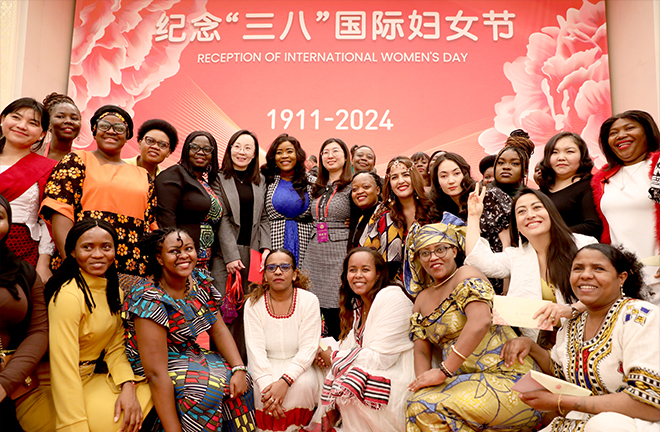Progress in feminist international relations theory

A reception in the run-up to International Women’s Day was held in Beijing on March 7. Photo: Zhao Jun/CNSphoto
Feminism stands as a distinct school of thought among international relations theories. Feminist international relations theory stays true to its original intention of social gender analysis, offering a new theoretical framework for international studies and upgrading the research agenda by updating theories.
Adhering to theoretical core
Social gender, as the core of feminist international relations theory, has both ontological and methodological significance. Through the mirror of social gender, feminism has criticized mainstream paradigms, established its own theories, and shifted the focus of international studies.
Prior to the emergence of feminist schools of thought, the notion that “international relations are gender-neutral” had long been accepted as common sense. However, beneath the facade of “gender neutrality” lies the absence of women. Feminism believes that international relations are not only gendered but also masculinized. The mainstream paradigm of international relations has deliberately shaped international relations into a “world without women.” Fundamental categories such as power, state, politics, and reason are established from a male-oriented perspective, reducing the richness of the world and the diversity of human experience, while also narrowing the scope of international relations theory.
From a feminist perspective, gendered international relations are embodied both in the male-dominated narrative of international relations and in the prevalence of gender metaphors in the international system and mainstream narrative. Therefore, feminist international relations theory is not limited to the examination of gender issues. Instead, it explores overlooked and marginalized issues that are laden with gender metaphors through the lens of gender. Feminist international relations not only strive for gender equality, but also endeavor to promote democracy and equality in international relations through gender justice.
Considering gender to be a noumenon, feminist international relations are committed to two theoretical tasks. The first is to identify and introduce the gender factor, offsetting the long-standing masculinity of international relations. The second is to transcend a single gender and create an international relations theory that leads to true international justice.
Adopting a gender approach, feminist international relations theory has progressed through three distinct stages. The first stage of academic criticism targeted the masculinity of mainstream paradigms, particularly the realist school of thought, and integrated women and women’s issues into international studies. The second stage of intellectual construction involved dialogue and exchange with mainstream paradigms to examine the systemic and constructive role of social gender in international relations. The third stage, marked by pragmatism, upholds the feminist stance and emphasizes the theoretical and practical significance of distinct gender experiences, particularly women’s experiences.
Redrawing theoretical landscape
Despite its historical positioning on the margins of the international relations knowledge system, feminism offers unique and valuable insights for international studies.
Feminism has led to the discovery of elements that have long existed within international relations but have been overlooked. Firstly, feminism points out that disregard for gender is detrimental to theory and practice alike, and no gender-neutral knowledge or practice exists within in international relations at present. Secondly, feminism advocates for a multi-dimensional perspective to understand international relations of which gender is a component.
Traditional international relations theories are built upon numerous gender-biased assumptions which presume that femininity is incongruent with the prevailing power-centric self-help system, positioning “emotional” women as “others” within international relations. Feminism has overcome the thematic limitations imposed by mainstream paradigms by introducing subjects excluded from traditional discourse, demonstrating that women, women’s issues, and gender issues are inherent components of international relations.
Reorientation
Responding to the reality of international relations and the demand for theoretical development is an important driving force for the advancement of feminist international relations theory. Early feminism sought external recognition of its strength, demonstrating its theoretical uniqueness in the debate and dialogue with mainstream paradigms. Current feminism relies more on endogenous power, adjusting its research focus through introspection to advance its own theory.
First, feminism has shifted from normative research to empirical research. The former describes what kind of international relations are pursued by feminism, while the latter addresses how to achieve desirable international relations. Feminism draws material for knowledge production from distinct experiences, arguing that only through rich and diverse everyday experiences can the complexity, diversity, and possibilities of international relations be reflected and a viable path to realizing aspirations be found.
Second, feminism has shifted its attention from grand issues to everyday politics. While early feminism was centered on abstract interpretation of grand “international” issues, current feminism places greater emphasis on personal expression regarding microscopic “individual” issues. Feminism has realized that gender unwittingly permeates people’s everyday thoughts and actions. International relations exist not only on battlefields and in bases, but also in markets and fields.
Third, feminism has turned its eye to self-improvement. Feminism seeks to produce knowledge that integrates women and their experiences and thereby build a just and sensible world. Feminism has increasingly realized that truly well-developed theories grow from within and provide people with intellectual tools for understanding and guiding the world. Therefore, current feminism systematically develops its own theory to communicate feminist thought to the world.
Looking back, feminism’s entry into the field of international relations stage may have been late, but it did eventually arrive. Looking ahead, the journey of feminism hand in hand with international relations is far from over.
Su Yunting is a professor in the School of Marxism at Dalian Jiaotong University.
Edited by WANG YOURAN
